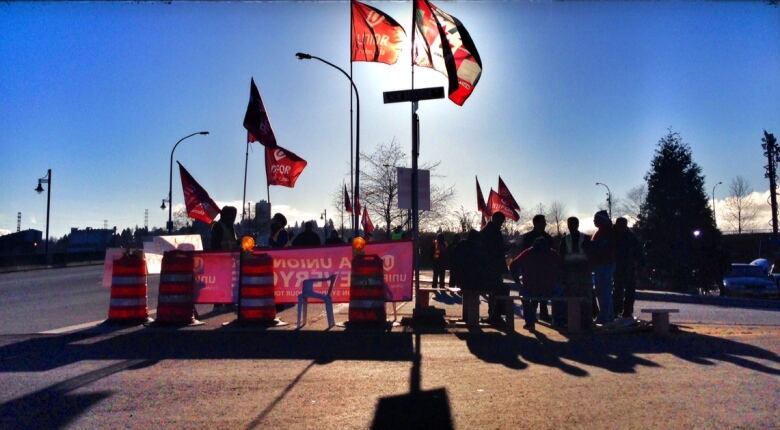Port Metro Vancouver strike: back-to-work legislation introduced
Bill provides for fines of $10k per day for union and $400 a day for workers who defy order
The B.C. government has introduced back-to-work legislation in an effort to end the ongoing strike by container truck drivers at Port Metro Vancouver.
Bill 25 will directly affect about 250 unionized truckers who are members of Unifor, and includes a 90-day cooling off period.
B.C. Transportation Minister Todd Stone said the bill could pass as early as today, but if it is opposed, passage might not come until Wednesday. The NDP has said it will oppose the bill.
About 1,500 unionized and non-unionized workers have been off the job for about three weeks.
The legislation provides for fines of $10,000 a day for the union and $400 a day for workers who defy the back-to-work order.

Labour Minister Shirley Bond says legislation is necessary after she said other efforts to end the dispute failed.
"This legislation is being tabled reluctantly and comes after multiple attempts over recent weeks to end the dispute and get Port Metro Vancouver back to full capacity," she said. "The disruption at Canada's largest and busiest port is impacting our economy, jobs and our trading reputation."
However, angry drivers have already pledged to defy any legislation, arguing word of the forced end to the dispute has encouraged employers to quit seeking a negotiated solution to complaints such as long wait times and undercutting by other drivers.
Gavin McGarrigle with Unifor, the union representing the container truck drivers, says unionized truckers represent only 250 of the more than 1,000 truckers. He says the legislation won't work because government has no control over independent truckers, who make up the bulk of the strikers.
Those truckers, represented by the United Trucker's Association, have vowed to continue the strike.
However, port officials said last week thatdrivers who don't return to work risk losing their port operating licences. Port Metro Vancouver president Robin Silvestersaidtruckers had already started returning to work.
"Towards the end of the week, we were around 40 per cent of normal operation level. Over the weekend, one of the largest terminals was open and had 700 truck moves, which is a very large number for a weekend day. So it seems very clear that people are deciding they want to go back to work."
Silvester said he wants to see truckers get a good wage, but the way to achieve that is by keeping things moving at the port.
More than 1,000 non-union truckers first walked off the job in February at the port's container terminals. They were joined by the unionized truckers on March 10.
The ongoing strike has delayed both imports and exports and could affect Canadas trade deficit in March.
Exports such as grain, meat, lumber and coal are waiting to reach the port. Imports of consumer goods, including wine and beer, that arrive in containers are sitting in Vancouver waiting to be shipped via truck.
With files from Rafferty Baker and The Canadian Press













_(720p).jpg)


 OFFICIAL HD MUSIC VIDEO.jpg)
.jpg)



























































































